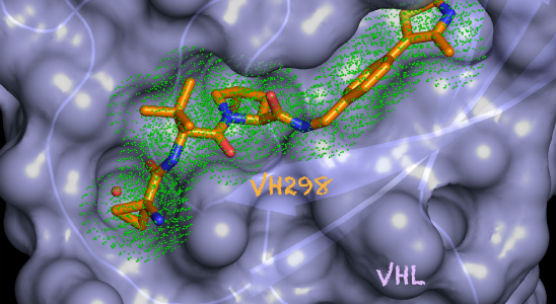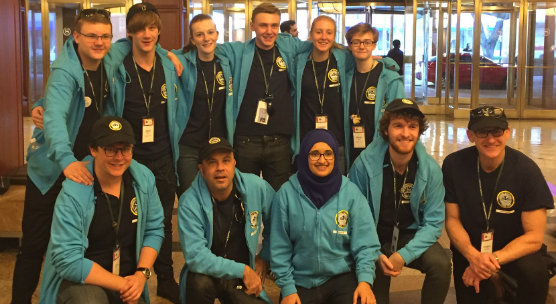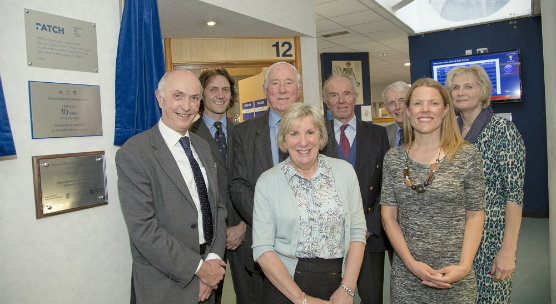4 Nov 2016
`Molecular commando’ identified to tackle hypoxia pathway
Scientists at the University of Dundee have identified a `molecular commando’ which can be stealthily deployed to activate a hypoxic response, a process which can help to fight a range of conditions including stroke, angina, colitis and brain injuries. A Dundee team led by Professor Alessio Ciulli in the School of Life Sciences have used pioneering techniques to develop a `small molecule’ chemical probe called VH298, which offers highly targeted access to the parts of the cell which regulate hypoxia, known as the hypoxic signalling pathway. “Using a small molecule like this offers a hig...

4 Nov 2016
‘Reanimating H.G. Wells’ – new exhibition at Tower Foyer Gallery
An exhibition of art, design and typography created in response to the work of pioneering sci-fi writer H.G. Wells will open at the University of Dundee tonight. ‘Reanimating H.G. Wells’, which will be held in the University’s Tower Foyer Gallery, is the inaugural event in a month-long programme marking the 150th anniversary of Wells’ birth. That programme, ‘H.G. Wells at 150: Hope and Fear’, takes place as part of Being Human 2016, a national festival of the humanities. The exhibition features work by students at Duncan of Jordanstone College of Art & Design in a ...

4 Nov 2016
New protein key to better drugs for neglected diseases
A newly identified method of activating drugs to combat one of the world’s most destructive `neglected’ diseases could lead to better medicines according to new research led by the University of Dundee. Visceral leishmaniasis (VL) is a disease which blights the developing world with 200,000 to 400,000 new cases and an estimated 40,000 deaths annually, making it the second biggest parasitic killer after malaria. The vast majority of cases are seen in seven countries - India, Nepal, Bangladesh, Brazil, Ethiopia, South Sudan and Sudan. There are no vaccines available and current drug treatments ...

3 Nov 2016
Dundee iGEM team and local school pupils take home gold at world jamboree
A team of students from the University of Dundee and local school pupils have both won gold medals at this year’s iGEM Jamboree in Boston, USA. The students, from across the University, achieved the gold for their work to try and combat antimicrobial resistance in livestock. They noticed that the overuse of antibiotics, particularly in the poultry and pig farming industries, was causing problems. Instead of using conventional antibiotics, the students came up with idea to engineer a toxic protein to kill the pathogenic strains of bacteria that infect livestock. They planned to develop a new chicken...

2 Nov 2016
Efforts to help doctors treat the dying recognised
A plaque marking the University of Dundee’s efforts to help doctors care more effectively for the dying has been unveiled at Ninewells Hospital. Palliation and the Caring Hospital (PATCH), a charity which supports specialist palliative care for patients in Scotland, unveiled the plaque at a ceremony attended by representatives of the University’s School of Medicine and NHS Tayside. The charity initiated the accolade in recognition of the unique collaboration between the three organisations, who have developed a series of workshops to help healthcare professionals have honest and open conversa...

- << < 1
- 2
- 3
- 4
- 5
- 6
- 7
- 8
- 9
- 10
- 11
- 12
- 13
- 14
- 15
- 16
- 17
- 18
- 19
- 20
- 21
- 22
- 23
- 24
- 25
- 26
- 27
- 28
- 29
- 30
- 31
- 32
- 33
- 34
- 35
- 36
- 37
- 38
- 39
- 40
- 41
- 42
- 43
- 44
- 45
- 46
- 47
- 48
- 49
- 50
- 51
- 52
- 53
- 54
- 55
- 56
- 57
- 58
- 59
- 60
- 61
- 62
- 63
- 64
- 65
- 66
- 67
- 68
- 69
- 70
- 71
- 72
- 73
- 74
- 75
- 76
- 77
- 78
- 79
- 80
- 81
- 82
- 83
- 84
- 85
- 86
- 87
- 88
- 89
- 90
- 91
- 92
- 93
- 94
- 95
- 96
- 97
- 98
- 99
- 100
- 101
- 102
- 103
- 104
- 105
- 106
- 107
- 108
- 109
- 110
- 111
- 112
- 113
- 114
- 115
- 116
- 117
- 118
- 119
- 120
- 121
- 122
- 123
- 124
- 125
- 126
- 127
- 128
- 129
- 130
- 131
- 132
- 133
- 134
- 135
- 136
- 137
- 138
- 139
- 140
- 141
- 142
- 143
- 144
- 145
- 146
- 147
- 148
- 149
- 150
- 151
- 152
- 153
- 154
- 155
- 156
- 157
- 158
- 159
- 160
- 161
- 162
- 163
- 164
- 165
- 166
- 167
- 168
- 169
- 170
- 171
- 172
- 173
- 174
- 175
- 176
- 177
- 178
- 179
- 180
- 181
- 182
- 183
- 184
- 185
- 186
- 187
- 188
- 189
- 190
- 191
- 192
- 193
- 194
- 195
- 196
- 197
- 198
- 199
- 200 > >>